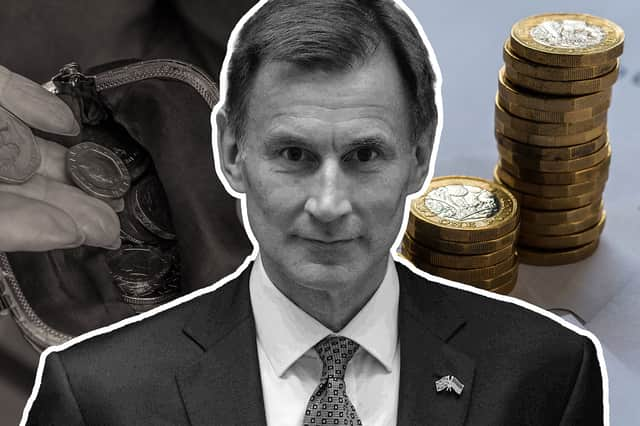Autumn Statement 2022 analysis: Jeremy Hunt failed to fix the foundations for levelling up


Alongside today’s Autumn Statement, the Office for Budget Responsibility (OBR) released new economic forecasts. They show that rising prices will erode real wages and reduce living standards by 7% over the next two years, which could see the worst for living standards since modern records began in 1956. When we look internationally, the UK remains the only G7 country stuck below pre-pandemic economic peaks. Today’s statement has not improved our prospects.
Nevertheless, there was some cause for slight relief from the Chancellor’s announcements. Short-term deep cuts to public services were avoided, and reduced capital gains and dividend income allowances were announced, which started what should be a national journey towards a fairer tax system where unearned incomes are taxed the same as hard-earned incomes through wages.
Advertisement
Hide AdAdvertisement
Hide AdThere was further positive news in the form of the announcement that devolution will be extended to more areas of England, as well as limited references to deepening devolution in the trailblazer areas of Greater Manchester and West Midlands. Hidden in the detail was a suggestion of exploring ‘single departmental-style settlements’ instead of competitive bidding processes for those places: a long-awaited change, conceding IPPR North’s argument that competitions are a poor way to level up.
Yet the Chancellor failed to use the fiscal space available to him, to truly measure up to the challenges our country faces — the immediate cost-of-living emergency and the longstanding need to level up and end regional inequality. He left public services facing deep cuts in years to come, enforced public sector pay cuts, and slashed the investment needed to fuel our economy.
Despite the noise generated by ‘levelling up’ there was little in today’s statement to narrow divides as they deepen in the cost-of-living emergency. In fact, at a time of high inflation, standing still equals cuts. Jeremy Hunt’s decision to hold capital spending steady in cash terms means inflating away what can be delivered. Indeed, IPPR North analysis released today highlights that more than £0.5 billion of levelling up funding is being lost due to inflation and delays delivering funding, equal to £1 in every £13 for two key levelling up pots: the Shared Prosperity and Levelling Up funds.
Clearly, a commitment by government to regional investment is lacking. Promises about ‘core Northern Powerhouse Rail’ and HS2 to Manchester likely mean only the transport investment outlined in the disappointing Integrated Rail Plan is planned. It is almost exactly a year since that plan was announced, which IPPR North labelled as ‘more broken transport promises’. Today’s reannouncement gives cause to repeat that: anything other than ‘full fat’ Northern Powerhouse Rail is yet another broken promise to the North.
Advertisement
Hide AdAdvertisement
Hide AdWhat’s more, there were other announcements today that could hinder levelling up further, like the hancellor’s decision not to support local authorities with surging inflation and instead to raise council tax limits. While we would generally celebrate improved flexibility for local authorities to raise funds for public services and investment, specifically raising council tax limits in the absence of any other support or fiscal devolution will widen inequality. And using the word ‘flexibility’ here is questionable too because local authorities have little choice but to increase council tax to respond to inflationary pressures, as conceded by the OBR’s assumption of a 5% council tax increase across England.
Areas with pricier properties will raise more, while places with lower property values, particularly in the North, will raise less. What’s more, less well-off places will have much higher exposure to inflationary pressures—meaning deeper local cuts—than the wealthiest places. That does not close regional divides, it widens them.
Ultimately, what underlined today’s Statement was poor economic thinking. The Chancellor spoke about not leaving any debts to the next generation and claimed “you cannot borrow your way to growth" but that is neither sensible nor credible. Borrowing to invest is critical to building strong economic foundations that deliver prosperity. Leaving the next generation without any assets - just weak public services, ailing infrastructure, regions locked out of prosperity, and an unbalanced economy – is an abject policy failure. Yet this status quo and the economic thinking that drives it that hollowed out the foundations of our economy, that prevailed today.
Government can choose to forge a different path. Investing in the things that enhance peoples’ quality of life, empower communities, and build a stronger economy where people, public services, and businesses can thrive will benefit everyone. They can kick-start our economy and accelerate efforts to close our regional divides, investing in regions and building institutional capacity through policies like fiscal devolution. Unlocking the potential of regions like the North can deliver prosperity that will be felt not only in the North but across the whole country.
Marcus Johns is a research fellow at IPPR North. He tweets @MarcusIPPR.
Comment Guidelines
National World encourages reader discussion on our stories. User feedback, insights and back-and-forth exchanges add a rich layer of context to reporting. Please review our Community Guidelines before commenting.
